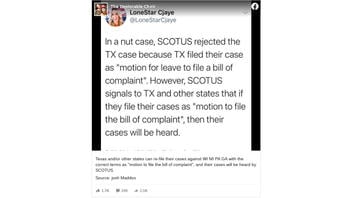
Did the U.S. Supreme Court signal it would reconsider the Texas lawsuit seeking to overturn the results of the 2020 election, if refiled "with the correct terms"? No, that's not true: Election law experts consulted by Lead Stories agreed that technical differences in filing would not make any difference in the outcome of the case. They consider it closed. As one expert wrote: "It's not a minor linguistic issue. It's the core issue of TX's claim that the Court rejected."
The claim appeared in a Facebook post (archived here) published on December 11, 2020. The post opened: "Texas and/or other states can re-file their cases against WI MI PA GA with the correct terms as 'motion to file the bill of complaint', and their cases will be heard by SCOTUS." It also included an image that looked like it was made from another user's tweet. The text in that image read:
In a nut case, SCOTUS rejected the TX case because TX filed their case as 'motion for leave to file a bill of complaint'. However, SCOTUS signals to TX and other states that if they file their cases as 'motion to file the bill of complaint', then their cases will be heard.
This is what the post looked like at the time of writing:
(Source: Facebook screenshot taken on Mon Dec 14 17:20:11 2020 UTC)
On December 11, 2020, the Supreme Court rejected the Texas suit against four battleground states: Pennsylvania, Georgia, Michigan and Wisconsin. The suit sought to throw out voting results in those states -- all of which were won by Joe Biden -- and overturn the results of the 2020 election. The attorneys general of 17 other states filed a "friend of the court" brief supporting Texas' position and 106 Republican members of the U.S. House supported a similar brief calling for the election to be overturned.
In its brief order, the court said Texas did not have legal standing to sue. Specifically, the order stated:
Texas has not demonstrated a judicially cognizable interest in the manner in which another State conducts its elections.
Significantly, no dissents were issued. But Justices Samuel Alito and Clarence Thomas issued a statement, which read:
In my view, we do not have discretion to deny the filing of a bill of complaint in a case that falls within our original jurisdiction. See Arizona v. California, 589 U. S. ___ (Feb. 24, 2020) (Thomas, J., dissenting). I would therefore grant the motion to file the bill of complaint but would not grant other relief, and I express no view on any other issue.
In other words, two of the nine justices thought the court does not have the discretion to turn down a case between two states. But Alito and Thomas made clear that even if the court were to have taken the case, they would not have granted an injunction to stop the states from finalizing their election results.
Election law experts told Lead Stories the ruling was unequivocal. Rebecca Green, co-director of the Election Law Program at William & Mary Law School, wrote:
There is no way the Supreme Court will take the case, however packaged. Even Alito and Thomas signaled that they would deny the relief requested. The Court very firmly said that it would not entertain a claim from one state about how another state runs its election. Period. It's not a minor linguistic issue. It's the core issue of TX's claim that the Court rejected.
Similarly, Rick Hasen, a professor and election law expert at the University of California Irvine, said:
The Supreme Court shut the door on taking the Texas case. I do not believe technical differences in filing would have made any difference.
In order to accept a case, four of the court's nine justices must vote to do so.













